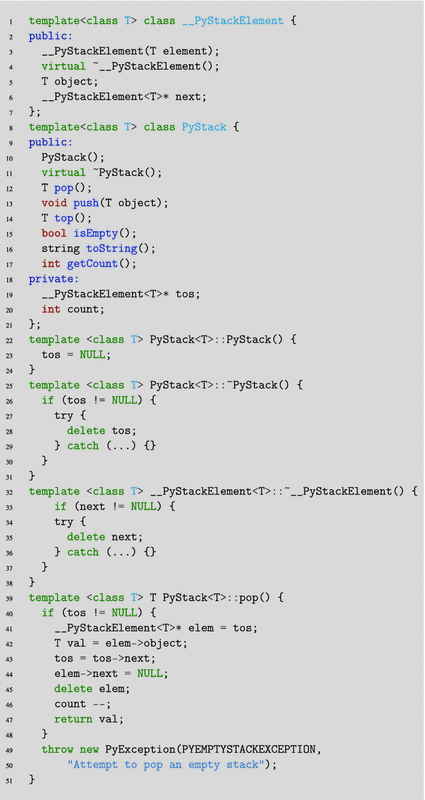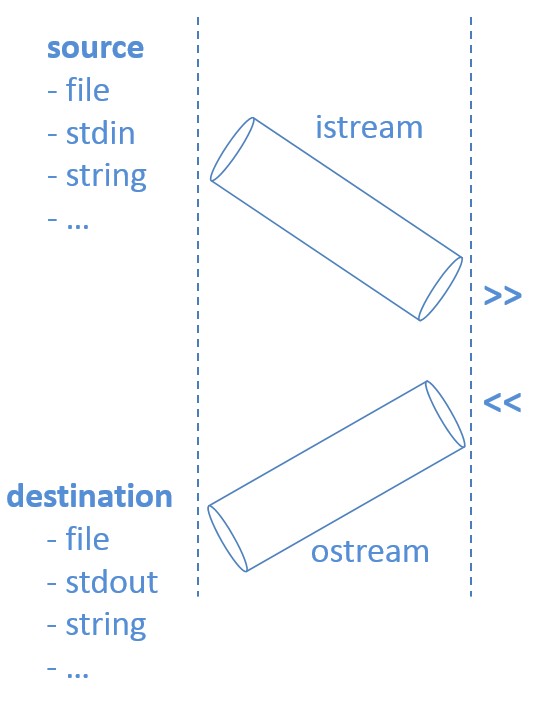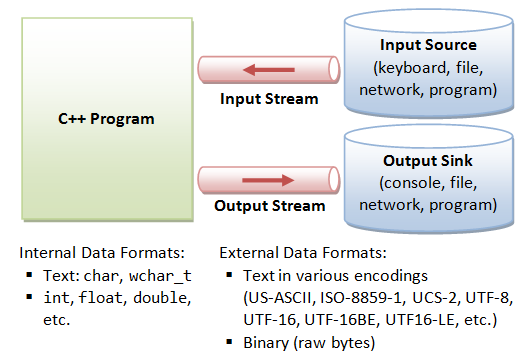
These member types are inherited from its base classes ostream and iosbase: event Type to indicate event type (public member type ) eventcallback Event callback function type (public member type ) failure Base class for stream exceptions (public member class ) fmtflags Type for stream format flags (public member type ) Init. Or run find / -type f -name iostream 2 /dev/null grep include or locate iostream grep include (provided the database is current, otherwise prepend with a call to updatedb)-these, however, will print also non-system-wide includes, so please adjust appropriately. The actual C include path is easily found with something like. Is there a null std::ostream implementation in C or libraries? (3) I'm looking for a std::ostream implementation that acts like /dev/null. It would just ignore anything that is streamed to it. Does such a thing exist in the standard libraries or Boost? Or do I have to roll my own? C opens the istream object cin when the program starts. Similarly, ostream is the basis for output. The prototypes above are for inserters and extractors for pointers to null terminated character strings (like “My name”), for string objects, for ints, and for doubles. 971 // with rawnullostream, but it's better to have rawnullostream follow 972 // the rules than to change the rules just for rawnullostream.
C++| Language | ||||
| Standard Library Headers | ||||
| Freestanding and hosted implementations | ||||
| Named requirements | ||||
| Language support library | ||||
| Concepts library(C++20) | ||||
| Diagnostics library | ||||
| Utilities library | ||||
| Strings library | ||||
| Containers library | ||||
| Iterators library | ||||
| Ranges library(C++20) | ||||
| Algorithms library | ||||
| Numerics library | ||||
| Localizations library | ||||
| Input/output library | ||||
| Filesystem library(C++17) | ||||
| Regular expressions library(C++11) | ||||
| Atomic operations library(C++11) | ||||
| Thread support library(C++11) | ||||
| Technical Specifications |
| I/O manipulators | ||||
| C-style I/O | ||||
| Buffers | ||||
(deprecated in C++98) | ||||
(C++20) | ||||
| Streams | ||||
| Abstractions | ||||
| File I/O | ||||
| String I/O | ||||
| Array I/O | ||||
(deprecated in C++98) | ||||
(deprecated in C++98) | ||||
(deprecated in C++98) | ||||
| Synchronized Output | ||||
(C++20) | ||||
| Types | ||||
| Error category interface | ||||
(C++11) | ||||
(C++11) |
| Global objects | ||||
| Member functions | ||||
(C++11) | ||||
| Formatted output | ||||
| Unformatted output | ||||
| Positioning | ||||
| Miscellaneous | ||||
(C++11) | ||||
| Member classes | ||||
| Non-member functions |

Defined in header <ostream> | ||
| (1) | ||
template<class CharT, class Traits> basic_ostream<CharT,Traits>& operator<<( basic_ostream<CharT,Traits>& os, | ||
template<class CharT, class Traits> basic_ostream<CharT,Traits>& operator<<( basic_ostream<CharT,Traits>& os, | ||
template<class Traits > basic_ostream<char,Traits>& operator<<( basic_ostream<char,Traits>& os, | ||
template<class Traits > basic_ostream<char,Traits>& operator<<( basic_ostream<char,Traits>& os, | ||
template<class Traits > basic_ostream<char,Traits>& operator<<( basic_ostream<char,Traits>& os, | ||
| (2) | ||
template<class CharT, class Traits > basic_ostream<CharT,Traits>& operator<<( basic_ostream<CharT,Traits>& os, | ||
template<class CharT, class Traits > basic_ostream<CharT,Traits>& operator<<( basic_ostream<CharT,Traits>& os, | ||
template<class Traits > basic_ostream<char,Traits>& operator<<( basic_ostream<char,Traits>& os, | ||
template<class Traits > basic_ostream<char,Traits>& operator<<( basic_ostream<char,Traits>& os, | ||
template<class Traits > basic_ostream<char,Traits>& operator<<( basic_ostream<char,Traits>& os, | ||
template<class Ostream, class T > Ostream&& operator<<( Ostream&& os, | (3) | (since C++11) |
deleted overloads for basic_ostream and UTF character/array | ||
| (4) | (since C++20) | |
template<class Traits > basic_ostream<char,Traits>& operator<<( basic_ostream<char,Traits>& os, | ||
template<class Traits > basic_ostream<char,Traits>& operator<<( basic_ostream<char,Traits>& os, | ||
template<class Traits > basic_ostream<char,Traits>& operator<<( basic_ostream<char,Traits>& os, | ||
template<class Traits > basic_ostream<char,Traits>& operator<<( basic_ostream<char,Traits>& os, | ||
template<class Traits > basic_ostream<wchar_t,Traits>& operator<<( basic_ostream<wchar_t,Traits>& os, | ||
template<class Traits > basic_ostream<wchar_t,Traits>& operator<<( basic_ostream<wchar_t,Traits>& os, | ||
template<class Traits > basic_ostream<wchar_t,Traits>& operator<<( basic_ostream<wchar_t,Traits>& os, | ||
template<class Traits > basic_ostream<char,Traits>& operator<<( basic_ostream<char,Traits>& os, | ||
template<class Traits > basic_ostream<char,Traits>& operator<<( basic_ostream<char,Traits>& os, | ||
template<class Traits > basic_ostream<char,Traits>& operator<<( basic_ostream<char,Traits>& os, | ||
template<class Traits > basic_ostream<char,Traits>& operator<<( basic_ostream<char,Traits>& os, | ||
template<class Traits > basic_ostream<wchar_t,Traits>& operator<<( basic_ostream<wchar_t,Traits>& os, | ||
template<class Traits > basic_ostream<wchar_t,Traits>& operator<<( basic_ostream<wchar_t,Traits>& os, | ||
template<class Traits > basic_ostream<wchar_t,Traits>& operator<<( basic_ostream<wchar_t,Traits>& os, |
Inserts a character or a character string.
ch. If the type of the character is not CharT, it is first converted with os.widen(ch). Padding is determined as follows: if os.width()>1, then os.width()-1 copies of os.fill() are added to the output character to form the output character sequence.If (out.flags()&std::ios_base::adjustfield)std::ios_base::left, the fill characters are placed after the output character, otherwise before. After insertion, os.width(0) is called to cancel the effects of std::setw, if any.s.- for the first and third overloads (where
CharTmatches the type ofch), exactlytraits::length(s)characters are inserted. - for the second overload, exactly std::char_traits<char>::length(s) characters are inserted.
- for the last two overloads, exactly traits::length(reinterpret_cast<constchar*>(s)) are inserted.
Before insertion, first, all characters are widened using os.widen(), then padding is determined as follows: if the number of characters to insert is less than os.width(), then enough copies of os.fill() are added to the character sequence to make its length equal os.width(). If (out.flags()&std::ios_base::adjustfield)std::ios_base::left, the fill characters are added at the end of the output sequence, otherwise they are added before the output sequence.After insertion, width(0) is called to cancel the effects of std::setw Jesus redeems tamil songs mp3 free download. , if any.
s is a null pointer.Ostream is a class type publicly and unambiguously derived from std::ios_base.
[edit]Parameters
| os | - | output stream to insert data to |
| ch | - | reference to a character to insert |
| s | - | pointer to a character string to insert |
[edit]Return value
os[edit]Notes
Before LWG#1203, code such as (std::ostringstream()<<1.2).str() does not compile.
[edit]Example
Output:
[edit]Defect reports

The following behavior-changing defect reports were applied retroactively to previously published C++ standards.
| DR | Applied to | Behavior as published | Correct behavior |
|---|---|---|---|
| LWG 1203 | C++11 | overload for rvalue stream returned lvalue reference to the base class | returns rvalue reference to the derived class |
| LWG 2534 | C++11 | overload for rvalue stream was not constrained | constrained |
[edit]See also
C 2b 2b Ostream Dev Null Code
| inserts formatted data (public member function)[edit] |
| widens characters (public member function of std::basic_ios<CharT,Traits>)[edit] |